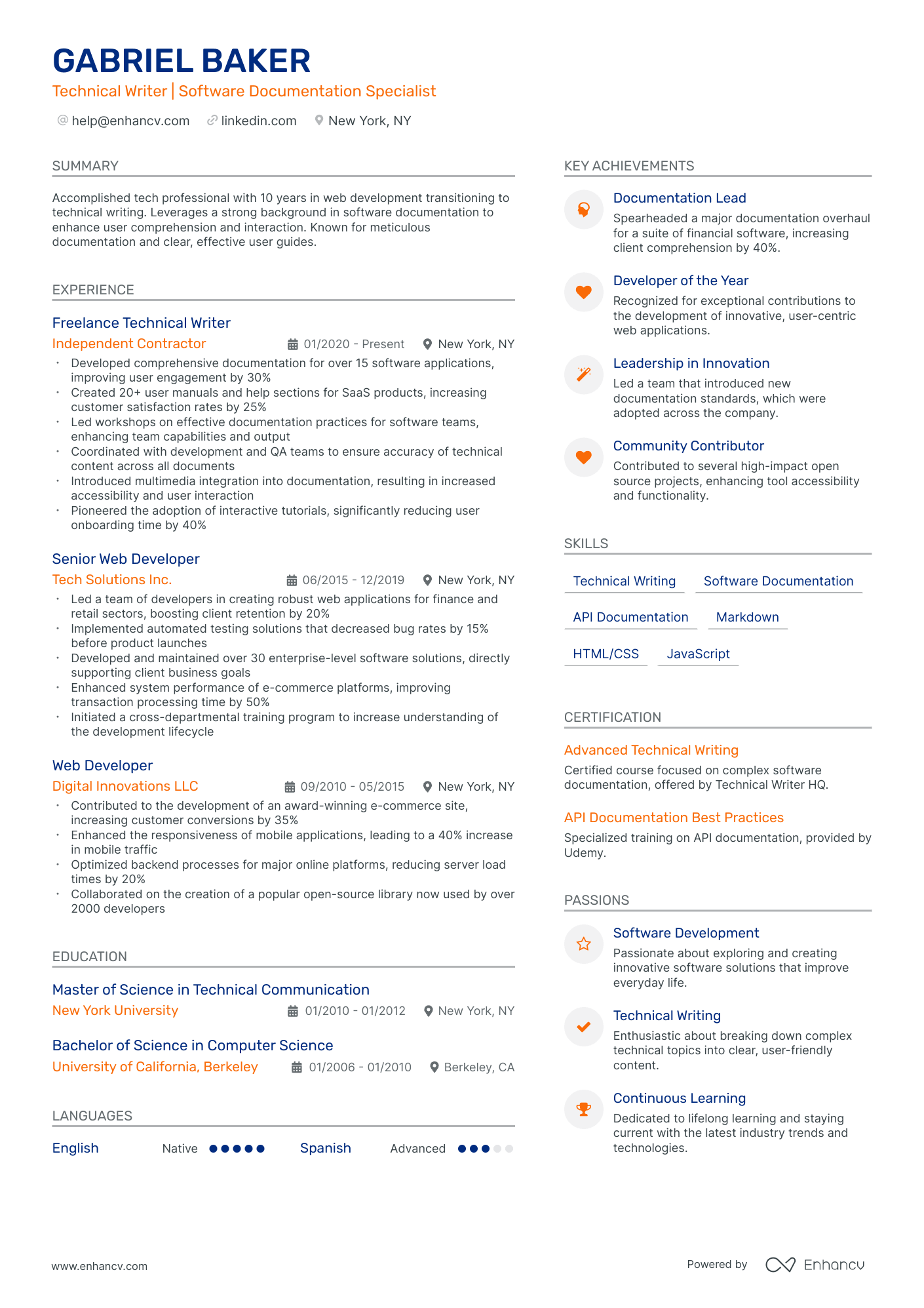Few people are lucky enough to follow one dedicated path throughout their career journey. For most of us, a career change is bound to take place sooner or later. Microsoft and LinkedIn research shows 46% of professionals are considering quitting their jobs in 2024. The reasons can vary greatly—from cultural to financial. Either way, deciding to take the career-change leap can be scary.
While recruiters will greatly appreciate a strong answer to the question, ‘Why do you want to change your career path?’, their first impression comes from a compelling career change resume summary. It can show recruiters why you deserve a chance, even if you haven’t been in the business that long.
This article is great for mid-career professionals, recent graduates, people transitioning from unrelated fields, or anyone who’s about to change their career.
We’ll cover:
- Why a strong resume summary is so important.
- How to write a resume summary for a career change.
- Career change resume summary examples.
Key takeaways for writing a great career change resume summary
- State your new career goal clearly.
- Highlight transferable skills.
- Mention relevant experience or education.
- Align with the job description.
- Demonstrate passion and motivation.
- Quantify your achievements.
- Keep it concise.
When you’re ready to dive into writing your career change resume, use our resume builder to get started.
Is your resume good enough?
Drop your resume here or choose a file. PDF & DOCX only. Max 2MB file size.
The importance of a strong resume summary
Your resume summary, immediately following your header, is the first impression you make on recruiters. It's your chance to highlight the value you bring to the new industry while giving a glimpse of your personality. By underlining key career accomplishments and transferable skills, your summary allows you to make a strong impact—even if your experience in the new field is limited.
For career changers, this is especially crucial. Your summary should quickly convey that, despite your background in a different industry, you have the relevant skills, drive, and adaptability to excel in your new career path.
How to format a resume summary
Like every section of your resume, your summary needs to be clear and concise, no more than three to five sentences. Recruiters have stacks of resumes to review, so make it easier for them to spot the information they need.
For a career change summary, cover the most important and most relevant information, such as:
- Professional title and intent: Start by stating your new career goal or target position to show you're focused on the transition.
If you want to focus on your career goals rather than your experience, you might choose a resume objective. It’s shorter (up to 3 sentences) and suitable for career changers or entry-level candidates.
- Transferable skills: Highlight key skills from your previous career that are applicable to the new field (e.g., communication, problem-solving, leadership, etc.).
- Relevant experience or education: Mention any experiences, certifications, or education that relate to the new career, even if gained outside traditional work environments, such as courses, volunteer work, or side projects.
- Passion and motivation: Briefly explain your passion for the new career path and how your previous experiences make you a strong candidate.
PRO TIP
Align your resume with the wording of the job description and pay attention to formatting aspects like date formats and bullet points, as these can impact ATS (Applicant Tracking Systems) readability.
A good formula to use when writing your summary:
Introduce your current or past role and skills > State your greatest accomplishment > Show that you’re the right fit for the new role.
How to write a resume summary for a career change
Even with the formula above, you’re probably still wondering how to introduce the idea of a career change in your summary without losing recruiters’ interest. Some of it is luck—you have to trust the recruiter’s vision extends beyond your work experience. But you can also help them see by focusing on transferable skills in your career change resume.
For example, skills like project management, customer service, or problem-solving may translate seamlessly into your new career path. Think about the overlap between the positions you’ve taken so far and your desired job. What can you bring to your target role?
Be aware: a career change is different from a job change. For example, if you were a chef at a local restaurant and decided to work for a restaurant in another city, that’s a job change. But if you were an accountant, and are now aiming to become a chef, that’s a career change.
To make your resume impactful, use action words and quantify achievements. Instead of “Was responsible for managing,” use “Managed a team of 10, enhancing productivity by 15%.” Add specific results like, “Increased sales by 30% through targeted campaigns.” In this process, avoid personal pronouns—replace “I developed a new process” with “Developed a new process that reduced waste by 20%.” This keeps your resume concise and focused on results.
Career change resume summary examples
Over the past two to three years, many workers have switched careers due to factors like the COVID-19 pandemic, burnout, or the desire for better work-life balance. The summaries below capture some of the most common career changes in different industries. Use them as inspiration when you’re ready to write your summary.
Retail to e-commerce
Dynamic retail professional with over five years of experience optimizing customer experiences and driving sales in fast-paced environments. Skilled in inventory management, customer relationship building, and data analysis to improve purchasing patterns. Seeking to leverage expertise in customer engagement and sales strategy in an e-commerce role, with a focus on expanding online retail operations.
Hospitality to healthcare
Dedicated hospitality manager with a proven track record of enhancing guest satisfaction through excellent service and operational management. Strong background in patient interaction, multitasking, and crisis management, making a seamless transition to a healthcare administrative role. Eager to apply skills in service optimization and teamwork in a healthcare environment to improve patient outcomes and facility efficiency.
Education to EdTech
Experienced educator with seven years of experience designing and implementing curriculum that enhances student learning outcomes. Adept at utilizing digital tools and technologies to create interactive learning environments. Transitioning to an EdTech role to combine instructional expertise with tech innovation, aiming to develop solutions that empower educators and engage students through technology.
Marketing to digital marketing
Results-driven marketing professional with over five years of experience crafting compelling campaigns and growing brand presence across multiple channels. Adept at market research, branding, and consumer behavior insights, now seeking to leverage skills in data-driven decision-making and content creation in a digital marketing role focused on maximizing online engagement and conversion rates.
Office administration to remote work roles
Highly organized office administrator with over six years of experience managing schedules, coordinating meetings, and ensuring seamless office operations. Proficient in using cloud-based tools to streamline workflows and communications. Looking to transition to a remote work role where expertise in virtual collaboration and project management can enhance team productivity and flexibility.
Manufacturing to technology
Skilled manufacturing technician with eight years of experience overseeing production processes, quality control, and equipment maintenance. Known for identifying process improvements and integrating new technologies to boost efficiency. Ready to transition into a technology role, applying problem-solving skills and technical aptitude to drive innovation and operational success in tech-driven environments.
Finance to fintech
Analytical finance professional with six years of experience in financial planning, risk assessment, and budget management. Skilled in leveraging data to inform business decisions and streamline processes. Seeking to transition into a fintech role, where a deep understanding of financial systems and expertise in analytics can drive the development of cutting-edge financial solutions and digital services.
Project management to product management
Technology sector professional with 10 years of experience in management roles. Increased annual sales revenue at CloudComputing by 20% for three consecutive years. Seeking product management position at TR Software to identify customer needs and grow sales.
Graphic design to UX design
Graphic Designer with a passion for web development and e-commerce. Certified in UI/UX design and proficient in HTML and CSS. Seeking UX Designer role at Diamond Co to improve customer experience and engagement.
Web development to technical writing
Tech professional with 10 years of frontend and backend experience. Certified in Technical Writing by Technical Writer HQ and have provided software documentation for 15 companies. Seeking opportunity to provide technical knowledge and improve user experience in the position of Technical Writer.
Data science to software engineering
Data and programming expert with 12 years of experience in cloud-based software. Provided statistical analysis for a software development project that earned $3.5M. Proficient in Python, Java, and SQL. Seeking opportunity to leverage software product knowledge and engineering experience as a Software Engineer at DataTech.
Product management to sales management
Management professional with 14 years of experience in the retail sector. Led team of 15 in product launch that earned $2.8M in sales revenue. Seeking opportunity to leverage expertise in product success and coach sales representatives in the position of Sales Manager.
These transitions reflect broader trends of job flexibility, a desire for better work-life balance, and the pursuit of higher income opportunities as workers reassess their career paths post-pandemic.
Final thoughts
Embarking on a career change is an exciting opportunity to redefine your professional path. Focus on your transferable skills, relevant achievements, and passion to create a compelling resume summary that stands out. With networking and continuous learning, you’ll be well on your way to confidently stepping into your new career.
Make one that's truly you.





